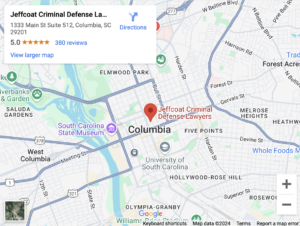The phrase “innocent until proven guilty” is ubiquitous in pop culture. While the presumption of innocence is fundamental to the American justice system, the actual words aren’t present in our country’s legal documents. Instead, the U.S. codifies the rights of the accused in several constitutional amendments. Should you ever find yourself charged with a crime, knowing your rights can help you navigate the legal system.
Constitutional Rights
Every person in the U.S. has rights under the Constitution, regardless of citizenship or immigration status. Theoretically, everyone has equal protection under the law, though socio political and economic factors affect legal outcomes in practice.
The majority of the rights we’ll discuss fall under the Bill of Rights, which is the first 10 amendments. These create clear legal boundaries to protect individuals from the government. Such limits are necessary to ensure the federal government remains an institution founded by the people, for the people, rather than becoming a dictatorship that infringes on individual rights.
In the context of the judicial system, the Constitution attempts to balance personal liberty and legal justice. We can find the verbiage guiding this effort in the Fourth, Fifth, Sixth, Eighth and 14th Amendments.
Fourth Amendment
The Fourth Amendment outlines when the government can inspect and take your property. Specifically, authorities cannot conduct “unreasonable searches and seizures.” Since this term is vague, we’ve historically relied on the courts to create a framework for determining whether law enforcement acted reasonably.
To protect your constitutional rights, authorities generally must get a warrant for a search. The warrant must list specific places and items, which limits the search. Law enforcement must also provide enough evidence to support the need for a search. Only then should a judge sign off on it.
However, there are several notable exceptions. Authorities may conduct a search without a warrant in the following situations:
- A police officer performs a lawful traffic stop on your vehicle.
- An officer suspects criminal activity after witnessing strange behavior.
- Law enforcement sees unlawful paraphernalia in plain sight.
- The property owner gives permission for a search.
Fifth Amendment
The Fifth Amendment contains the phrase “due process” — another vague term gradually defined by cases over the years. The core idea is that individuals have the right to legal proceedings before the powers that be can deprive them of “life, liberty, or property.”
This amendment also outlines several specific rights the government shall not infringe upon:
- Defendants must have a fair trial.
- Courts can’t try individuals for the same crime multiple times.
- A grand jury must indict individuals before authorities can hold them for trial.
Additionally, courts can’t force witnesses to provide self-incriminating evidence. You may have heard this right referred to as “pleading the Fifth.”
Sixth Amendment
The Sixth Amendment further outlines legal procedures and guarantees the following rights:
- An attorney to defend the accused
- Opportunity for the accused to confront those testifying for the prosecution
- A jury of peers to determine the verdict
- A speedy and public trial
- Knowledge of the criminal charges against them.
Glancing over the above list, you may notice a vital right missing. Yes, every accused has the right to an attorney — but who shall provide one if the defendant can’t afford it?
This matter wasn’t settled until 1963 when the Supreme Court ruled that the state must provide an attorney should individuals be unable to enlist their own. Before this, public defenders weren’t a given, and some defendants had no choice but to defend themselves, putting them at a severe disadvantage in proving their innocence.
Eighth Amendment
Though short, the Eighth Amendment includes essential protections for those accused or convicted of crimes:
- Courts can’t administer “cruel and unusual punishments.”
- Fines can’t be “excessive.”
- Bail can’t be set at an “excessive” level.
Like its predecessors, this amendment has seen clarification through the court system. The ban on cruel and unusual punishments has an especially fraught history, with courts going back and forth over the centuries. As society has evolved, our perception of what constitutes “cruel” has changed, noticeably affecting decisions over time.
For example, the death penalty is not currently considered cruel or unusual. However, due to the difference in brain development, no state or federal government may execute minors for an offense committed under the age of 18. Additionally, states may not mandate life without parole for juveniles, nor may they issue such a sentence if the crime isn’t a homicide.
The courts have also struggled to provide clear direction about whether the length of a sentence may cause it to fall under “cruel and unusual.” To date, the best criteria to determine the proportionality of the punishment to the crime is as follows:
- How do sentences for the same crime in other jurisdictions compare?
- How do other sentences in the same jurisdiction compare?
- How does the penalty’s harshness compare to the offense’s gravity?
Finally, the courts have deemed that specific punishments are clearly cruel and unusual. Among these are taking away a natural-born citizen’s citizenship, as well as the following types of execution:
- Drawing and quartering
- Burning alive
- Public dissection
- Beheading
- Disemboweling alive
Courts have declared that the Eighth Amendment bans similar physical tortures.
14th Amendment
Unlike the previous amendments, the U.S. added the 14th over 100 years after the ratification of the Constitution — right after the conclusion of the Civil War, in fact. It restates several of the rights of the accused previously expounded in the Bill of Rights but takes them one step further.
It’s important to realize that the original Bill of Rights only protected individuals from federal government overreach. The states have their own statutes, which is why some states allowed slavery while others outlawed it. Until the 14th Amendment, the Bill of Rights didn’t apply to enslaved people. Upon its passing, any person born in the U.S. automatically had citizenship and equal protection under the Constitution.
Practically, this means that the Bill of Rights protects individuals from state government overreach. This interpretation took many cases to reach, and we still see its evolution in cases such as Obergefell v. Hodges, which deemed bans on same-sex marriage unconstitutional. According to current standards, states may not deny individuals their civil rights due to the following:
- Nation of origin
- Religion
- Race
Miranda Rights
Miranda rights are familiar to most due to their frequent use in popular television shows, but what are they, really? Also called Miranda warnings, these rights aren’t separate from the aforementioned constitutional rights. Instead, they’re simplified statements of those rights delivered during arrest.
Not everyone knows the protections promised to those accused of a crime. As a result, individuals may accidentally forfeit those rights, which can lead to conviction. Miranda warnings, named after the case that established them, Miranda v. Arizona, require arresting officers inform the accused of the following:
- The state will appoint an attorney if the individual can’t afford one.
- The accused may have a lawyer present during questioning.
- The individual doesn’t have to speak to authorities.
The wording varies among departments, but it must cover these points. The 1966 ruling ensured failure to observe these rights had actionable consequences; testimony obtained without giving this warning is inadmissible in court. The same is true of testimony gathered after the accused has invoked the right to an attorney or to remain silent.
Criminal Defense Lawyer
If you’re facing criminal charges, you need an experienced attorney. Fortunately, the Jeffcoat Criminal Defense Lawyers firm can assist. To learn, contact us today.
Visit Our Criminal Defense Law Firm Located in Columbia, SC
Jeffcoat Criminal Defense Lawyers
1333 Main St Suite 512, Columbia, SC 29201
(803) 200-2000
Open 24/7


